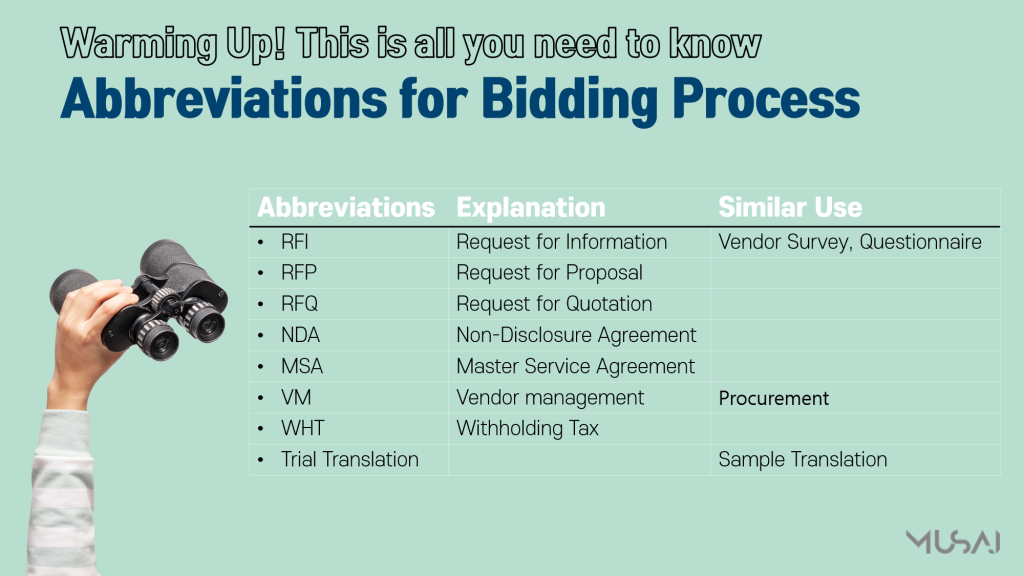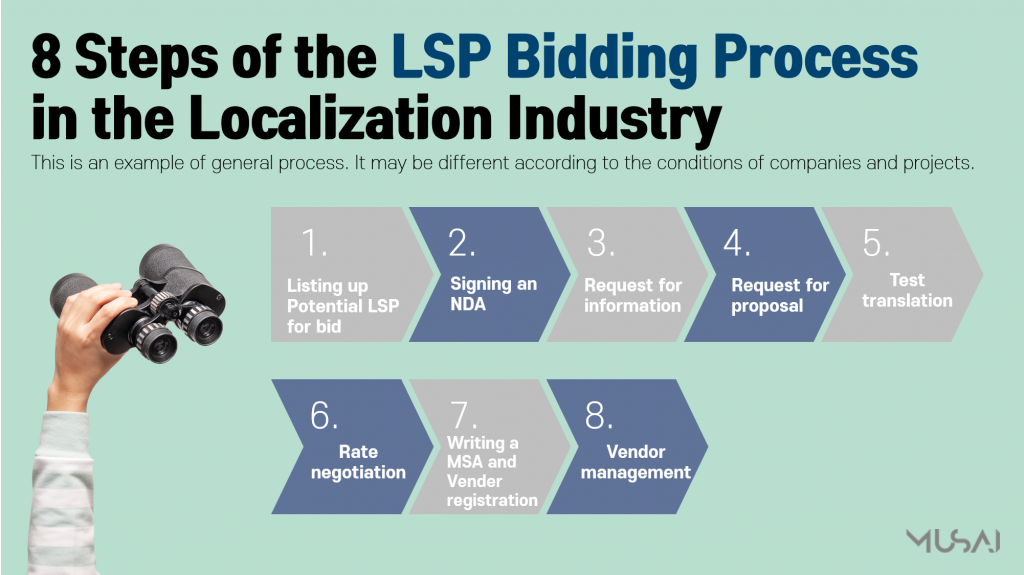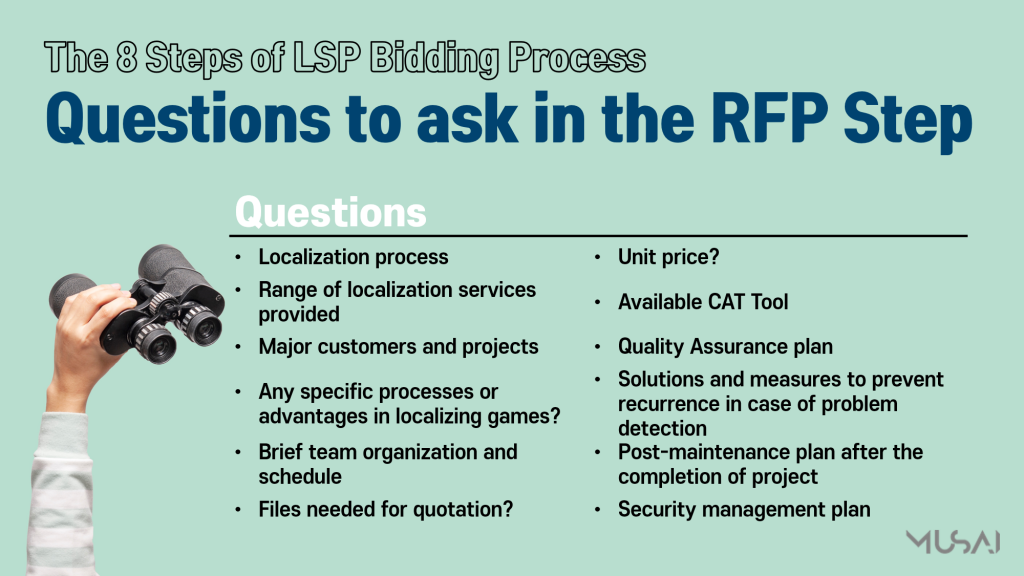[MUSAI] Localization Tips for Developers: the LSP Bidding Process Quick Guide

2021-04-08
This article is to guide our readers step-by-step through the bidding system in the localization industry, to be prepared for the successful LSP (Language Service Provider) selection.
Major game companies as well as large domestic companies follow their own bidding process when selecting outsource localization agencies. Each company has distinct features and the larger the company is, the more departments such as accounting and procurement teams are included in the process (which means more complicated). Nevertheless, looking at the brief bidding system would help gaining the insight on selecting a favorable LSP for the first time, and to compare and develop existing process. We will start with the basic terminology of the bidding system. Please follow along while keeping each step in-mind. Let’s start!
Warming Up, the Bidding Terminology
On this article, we will look into the bidding terminology and its abbreviations used in the LSP selection process. They might seem difficult but don’t be frustrated. They are simple terms combined together.
- RFI = Request for Information, (cf. Vendor Survey, Questionnaire)
- RFP = Request for Proposal
- RFQ = Request for Quotation
- NDA = Non-Disclosure Agreement
- MNDA = Mutual Non-Disclosure Agreement
- MSA = Master Service Agreement
- VM = Vendor management, cf. Procurement
- WHT = Withholding Tax
- Test Translation or Trial Translation (cf. Sample Translation)

8 Steps of the LSP Bidding Process in the Localization Industry
Since each project and companies have different condition and LSP requirements, the process presented below is not always correct. There may be more steps, or some may be omitted according to the conditions of companies.
1. Listing up potential LSP for bid
2. Signing an NDA
3. Request for information
4. Request for proposal
5. Test translation
6. Rate negotiation
7. Making MSA and Vender registration

The 8 Steps of LSP Bidding Process, Let’s Take a Step One by One
Each step in the bidding process includes much detailed contents, but we will briefly look into the major components of each step.
Listing up Potential LSP for bid
First, you will need select some candidates. Not sure what criteria are needed for selecting them? Refer to the articles below!
- How to Choose the Best LSP to Guarantee the Successful Korean Voice-over for Your Game? http://blog.musaistudio.com/musai-how-to-choose-the-best-lsp-to-guarantee-the-successful-korean-voice-over-for-your-game
- Localization Recruiting Ep 2. How to Find the Best Localization Vendors for Your Game http://blog.musaistudio.com/musai-localization-recruiting-ep-2-how-to-find-the-best-localization-vendors-for-your-game
Signing an NDA
Signing an NDA or MNDA is crucial since game localization is often processed simultaneously with its development.
RFI (Request for Information)
You can think of it as a step to confirm the LSP you selected as a candidate really exists. The full form of the company and information such as representative, address, business registration documents, and the number of employees, etc. are usually requested.
RFP (Request for Proposal)
After steps 2-3, and the company is verified, you may now proceed with the 4th step, the RFP. In this step, the information related to the project you are willing to localize would be shared and request each LPS for their proposal on the project. In short, you are basically asking “what is your plan?” to each LSP. The proposal you will receive would include team composition, localization process, delivery schedule, unit price, and related portfolio. Refer to the example below to get the idea, then you will know what to ask for.
Questions
Localization process
Range of localization services provided
Major customers and projects
Any specific processes or advantages in localizing games?
Brief team organization and schedule
Files needed for quotation?
Unit price?
Available CAT Tool
Quality Assurance plan
Solutions and measures to prevent recurrence in case of problem detection
Post-maintenance plan after the completion of project
Security management plan

Test/Trial Translation
No matter how profound the proposal is, if the translation quality is not suitable, it will be useless. Now that the NDA is signed, some part (about ~500 words) is extracted from the project-to-be-localized for trial translation. In some cases, steps form RFI, RFP to trial translation (steps 3-5) are requested in one swoop.
Rate Negotiation
At this stage, you will negotiate the unit price with the agencies that have passed the test translations. Usually, the unit price and the quality are positively correlated. For example, as more expense is invested on the resource, the quality is ought to go higher. In consequence, if the unit price is excessively cheap, the agency will have to fit their expenses in the budget and the quality may be decreased. This may be true even for the agencies well known for their high-quality translations. For such reasons, this step may be the trickiest one above all.
Moreover, it is recommended to proceed the step with several agencies, as the agency may refuse to proceed with the unit price you offer.
Making a MSA and Vendor Registration
Once the unit price is negotiated, you may proceed and write a contract. On the contract however, it is recommended to specify the payment method and payment cycle to reduce the possibility of disputes that may arise in the future. Especially when writing contracts with foreign companies, it is highly recommended to consult with internal accounting department to check the payment method, remittance fees, and taxes in advance. Now, you may list the company under your outsourcing agency management program.
Vendor management
Although it may seem it is all done, this is merely a start. No matter how famous and good the LSP is, its quality may depend on how you communicate and manage your project. (refer to the article: Localization PMs are doing nothing or everything? – Part 1. The role of localization project manager http://blog.musaistudio.com/musai-localization-pms-are-doing-nothing-or-everything-part-1-the-role-of-localization-project-manager)
If the conditions and expectations related to project quality is not shared or met, claims and correction must be made according to an agreed procedure.
Additional Tip: Distinct Features According to the Size of Agencies
- Large Companies usually follow their own process determined by the relevant departments (i.e., procurement or management support, etc.). In these companies, disagreement between the procurement team and the department that handles projects often arises in the ‘unit price.’ Procurement department tends to favor the agencies with the cheapest quotes, and the working department would like the companies proposing favorable schedule. For this reason, compromising is particularly difficult.
- Small and medium-sized companies often omit several procedures; when introduced by acquaintances, they may proceed with the projects immediately after receiving quotes. However, it is highly recommended to proceed the procedures listed below. These may be said to be the minimum safety measures to avoid or handle any disputes that may arise in the future.
NDA
Trial Translation
Write Contract
As mentioned earlier, the bidding process may differ depending on companies or projects. The process we introduced in the article is not a formal one, and it is usually avoided to disclose any specific details related to biddings in the competitive atmosphere. Yes, the process we shared may be too vague and unspecified. However, we do hope that this will help you establishing a fair bidding process to select a good LPS. If you have any questions or need more information, please do not hesitate to contact us.
** Did you enjoy the news of Musai? Please click subscribe and share the story.
BOOST YOUR PLAY! Musai Studio







